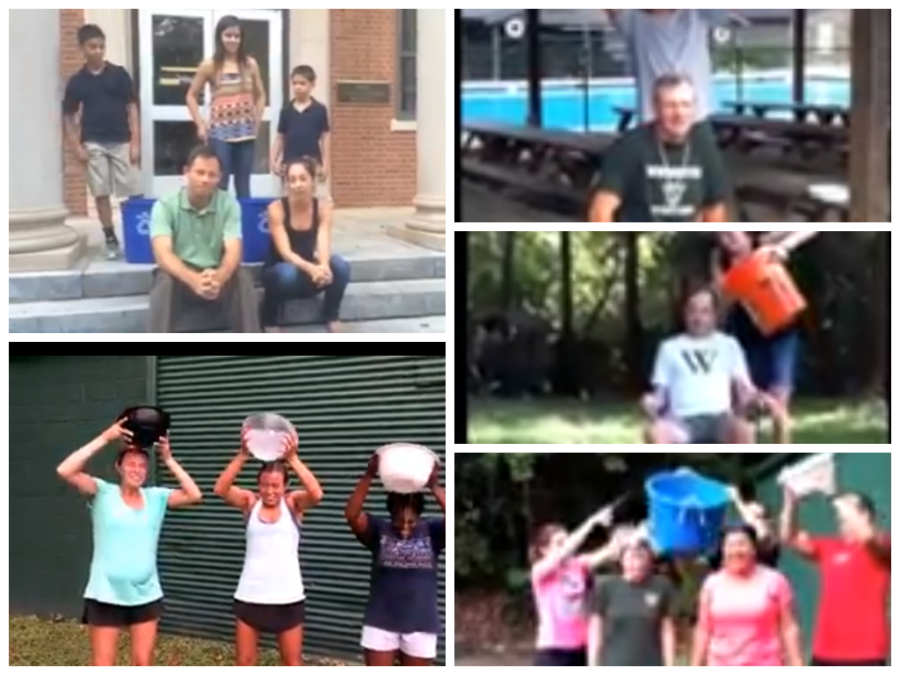Facebook “slacktivism” prompts icy and warm responses
Every child has played the game “telephone” before. Someone starts off with a statement and whispers it to their neighbor, who whispers it to their neighbor, and eventually the last person announces a skewed version of what the initial person said. That’s how I view the ALS Ice Bucket Challenge. Someone started by raising awareness and money for ALS charities, and as the message moved on through Facebook-nominated individuals, it got further and further away from its initial goal.
The ALS Ice Bucket Challenge, for anyone without Internet access, was a challenge in which people dumped ice on their own heads and then nominated their friends to do the same, with the option of donating money instead of suffering an icy shower. Overall, the challenge seemed successful; over $110 million went to The ALS Foundation, and many people learned something about the disease. And at the beginning of its run, the Ice Bucket Challenge made a difference.
“I have a good friend who has ALS,” said chorale director Fred Scott. “If I thought that [the Ice Bucket Challenge] would help her get well, I would do it 100 times and then 100 times again. I know that it can’t actually make those with ALS get well, but I think it can help us all to become aware of this disease.”
However, by the time I noticed the slew of videos on my newsfeed, the awareness aspect of the challenge had died off. First, I noticed the videos that were entitled “ALS Ice Bucket Challenge,” and I thought, “Oh, that’s interesting” and continued on with my life. For about two weeks, I watched ALS awareness videos auto-play on my computer without even knowing what ALS is or does. Eventually, the videos were just called “Ice Bucket Challenge,” without a mention of the disease whatsoever. The challenge was no longer to raise awareness for ALS, but to garner “likes” and to compete for funniest video.
“I’ll be very honest, I think that [the ice bucket challenge] is becoming less [about] awareness of what ALS is,” said sophomore Omari Matthews. “I just think that it’s sort of taking a turn for the worst in the sense that people aren’t really looking into what ALS is as much as blindly doing the ice bucket challenge because someone challenged them to do it. Intentions aside it’s beneficial, but when you think about it, people aren’t really doing it because they feel some attachment towards ALS.”
Furthermore, donating to the ALS Foundation became a punishment for not performing the chilly deed. Instead of encouraging people to donate, the phrasing of the Facebook statuses often read “Dump ice on your head in 24 hours or you have to donate $100 to ALS!” By phrasing it as something the nominee “had to” do if they didn’t make a video, it started portraying donations as something undesirable. Despite not wanting to donate to the charity, a lot of people dropped about $5 on two bags of ice, which is $5 that could have gone to an ALS-related charity.
“My brother actually had an ALS scare this summer because he had lost all feeling in his foot,” said junior Virginia Kuester, who chose to donate money instead of participate in a video. “Luckily, we found out later on it was just a minor little issue and he regained feeling about a month after his visit to the doctor. Also, since I was tagged by Virginia Thom who also donated instead of dumping ice, I felt partially inclined to do the same thing and proposed the idea of donating to my mom and she loved it. She wanted to help donate because of my brother and also just thought it was a bit more worth my time. And I thought my donating would help people realize the importance of the cause instead of just another ice video in their newsfeed.”
I’m not against the Ice Bucket Challenge or the concept of “slacktivism,” where liking a Facebook status equates making a difference. I enjoyed a lot of the videos; I think we were all rooting on Kenneth Hartzfeld when he got two Styrofoam cups to the head and I think we all cheered as Ross Peters, Mary Heald, and Keith Evans got soaked on the steps of Pressley. Eventually, I even looked up a Wikipedia article about ALS because nobody had explained it on Facebook yet. At the very least, the constant stream of videos inspired me to do so. Celebrities joined in, including my personal favorite of Matt Damon dumping toilet water on his head to make a statement about ALS and the amount of clean water people wasted in this movement.
In another video that circulated the web, some teenagers dumped feces, urine, and trash on an autistic boy who thought he was participating in the challenge. While not representative of the movement as a whole, the horrifying video demonstrated the abuse that can happen when a movement turns into a fad.
Now that the ALS Ice Bucket Challenge has ended, many other causes have adapted its social-media based strategy to get their messages out. I expect that before long, everyone will have newsfeeds full of a new cause. But before you click “like” to jump on the bandwagon, consider donating to the cause, researching the cause, or donating some time to a totally different cause altogether. Donate blood to the Red Cross. Volunteer with the Boys’ and Girls’ Club. Swing by Mr. Moor’s office in Pressley and ask what’s going on with the Community Service Club. “Like” that Facebook status, but remember that actions speak louder than video.



